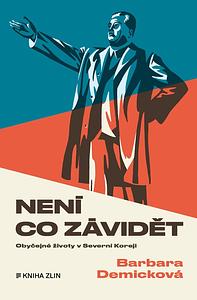You need to sign in or sign up before continuing.
Take a photo of a barcode or cover
This is another book that has been on my TBR for ages.
Non-fiction is not my go-to genre, but I enjoy reading it occasionally. I love learning more about other countries, cultures and people. This book was quite and eye-opener for me. I felt as though I had some understanding of North Korea, but not to the extent that is covered in this book.
This book follows the lives of 6 people who lived in North Korea and eventually defected to South Korea where they were able to speak freely to the author. Their stories were amazing. And devastating.
I am so glad that I read this and I recommend it to anyone wanting to learn more about ordinary lives in North Korea.
Non-fiction is not my go-to genre, but I enjoy reading it occasionally. I love learning more about other countries, cultures and people. This book was quite and eye-opener for me. I felt as though I had some understanding of North Korea, but not to the extent that is covered in this book.
This book follows the lives of 6 people who lived in North Korea and eventually defected to South Korea where they were able to speak freely to the author. Their stories were amazing. And devastating.
I am so glad that I read this and I recommend it to anyone wanting to learn more about ordinary lives in North Korea.
This poem really makes you realise how far education can be propagandised:
Where have we gone?
We have gone to the forest
Where are we going?
We are going over the hills
What are we are going to do?
We are going to kill the Japanese solders. -
Poem from a Grade ONE Reading Primer published in 2003
“It is axiomatic that one death is a tragedy, a thousand is a statistic. So it was for Mi-ran. What she didn't realize is that her indifference was an acquired survival skill. In order to get through the 1990s alive, one had to suppress any impulse to share food. To avoid going insane, one had to learn to stop caring.”
Note: Instead of a typical review format I thought I'd let this book speak for itself and update with some quotes, because this is all hard to digest (that and since I'm home and not in the field, I can open GR and Audible at the same time)
Review to come
Where have we gone?
We have gone to the forest
Where are we going?
We are going over the hills
What are we are going to do?
We are going to kill the Japanese solders. -
Poem from a Grade ONE Reading Primer published in 2003
“It is axiomatic that one death is a tragedy, a thousand is a statistic. So it was for Mi-ran. What she didn't realize is that her indifference was an acquired survival skill. In order to get through the 1990s alive, one had to suppress any impulse to share food. To avoid going insane, one had to learn to stop caring.”
Note: Instead of a typical review format I thought I'd let this book speak for itself and update with some quotes, because this is all hard to digest (that and since I'm home and not in the field, I can open GR and Audible at the same time)
Review to come
this book is utterly depressing and heart wrenching, every single damn page. yet, i am lucky because when i am finished reading this book, i no longer have to be in the world of north korea. reading the stories of people who were born and died in north korea are tragic because many of them truly believed kim jung-il to be their loving father who would always provide for them. "we have nothing to envy", they would sing. yet, many of them died of starvation, homeless on the streets, where a government had promised free health care and housing. the part that got to me the most was the school teacher who saw many of her students dropping like flies and slowly being taken out of school as they starved to death. it makes me think of my south korean students who are so lucky to be living here.
reunification seems impossible. the people in north korea are so brain-washed and even those that aren't, like defectors who were sent back to north korea, will have a hard time adjusting to south korean culture and making a living. even a doctor from north korea, who has studied for 10 years would have to start all over again. besides, the economic strain it puts on south korea to have that many people flooding in. i'm at a loss for what could be done..
it's maddening that that government keeps itself safe with nuclear weapons. i think this is an important read for anyone, especially those living in south korea.
reunification seems impossible. the people in north korea are so brain-washed and even those that aren't, like defectors who were sent back to north korea, will have a hard time adjusting to south korean culture and making a living. even a doctor from north korea, who has studied for 10 years would have to start all over again. besides, the economic strain it puts on south korea to have that many people flooding in. i'm at a loss for what could be done..
it's maddening that that government keeps itself safe with nuclear weapons. i think this is an important read for anyone, especially those living in south korea.
wow, timely book and very well written. Really had no idea what is going on in North Korea. Very sad!
Suomeksi Suljettu maa - elämää Pohjois-Koreassa. Hienosti kirjoitettu kuvaus elämästä Pohjois-Koreassa parin viime vuosikymmenen aikana. Kirjaan oli haastateltu useita Pohjois-Koreasta loikanneita ihmisiä jotka kertoivat elämäntarinansa. Hurjaa touhua ja aika karseaa luettavaa. Opin tästä paljon historiaa, vaikka kyllä tässäkin mietityttää mihin kaikkeen voi uskoa ja mikä kaikki on propagandaa. Mutta suosittelen lukemista!
challenging
dark
emotional
informative
sad
medium-paced
I feel the best way to learn about a place like North Korea is through the stories of people who lived there, and that’s exactly what this book does.
These stories are as informative as they are heartbreaking. Demick shares these stories beautifully and respectfully, you can tell how much she cares not only about North Korea, but also the stories of the people. Truly beautiful
These stories are as informative as they are heartbreaking. Demick shares these stories beautifully and respectfully, you can tell how much she cares not only about North Korea, but also the stories of the people. Truly beautiful
challenging
informative
medium-paced
challenging
dark
emotional
An interesting and readable insight into life in North Korea seen through the eyes of a cross section of citizens now living outside the regime. If you were wondering how badly things can go with a totalitarian regime with an unwillingness to change even in the face of mass starvation, look no further.
North Korea has always been a mystery to me (and let's face it, most people) and I have been fascinated by this isolated land held captive by a ruthless dictator. I was intrigued, then, when my brother lent me this account of North Korean life written by a journalist who has spent years gathering first-hand accounts from escapees.
It reads like a historical saga. You cannot quite reconcile the conditions and mentality of Korean authority with modern living. While the developed world was growing and learning in the 20th Century, North Korea stayed soundly in the past. In fact, as the rest of the great communist states fell or at least acquiesced to dealing with the 'free world', North Korea (with their last allies, Albania) stuck to their flawed communist guns and as such suffered terribly as their sources for power were systematically cut off. Without oil for their power stations, manfacturing stopped and food became increasingly scarse.
As one leader died, hope for change died with him as the son filled the father's shoes. Now with this son himself in ill-health, hope rises again that someone will allow this country to be revived. South Korea had a very different journey since the spilt and is now booming - a stark contrast to their starving neighbours to the north.
The title comes from a patriotic song taught to children as they start school (back when schools were all open and teachers were paid) and they are taught that their country us the pinnacle of the world; there is nothing to envy in the world, they are told, because everyone else in the world is worse off. How very sad that this could not be further from the truth.
It reads like a historical saga. You cannot quite reconcile the conditions and mentality of Korean authority with modern living. While the developed world was growing and learning in the 20th Century, North Korea stayed soundly in the past. In fact, as the rest of the great communist states fell or at least acquiesced to dealing with the 'free world', North Korea (with their last allies, Albania) stuck to their flawed communist guns and as such suffered terribly as their sources for power were systematically cut off. Without oil for their power stations, manfacturing stopped and food became increasingly scarse.
As one leader died, hope for change died with him as the son filled the father's shoes. Now with this son himself in ill-health, hope rises again that someone will allow this country to be revived. South Korea had a very different journey since the spilt and is now booming - a stark contrast to their starving neighbours to the north.
The title comes from a patriotic song taught to children as they start school (back when schools were all open and teachers were paid) and they are taught that their country us the pinnacle of the world; there is nothing to envy in the world, they are told, because everyone else in the world is worse off. How very sad that this could not be further from the truth.
adventurous
informative
inspiring
fast-paced



